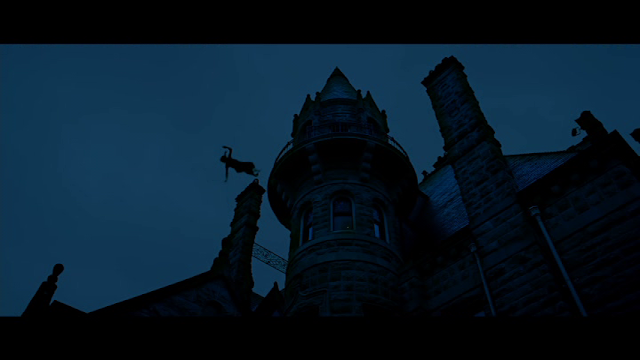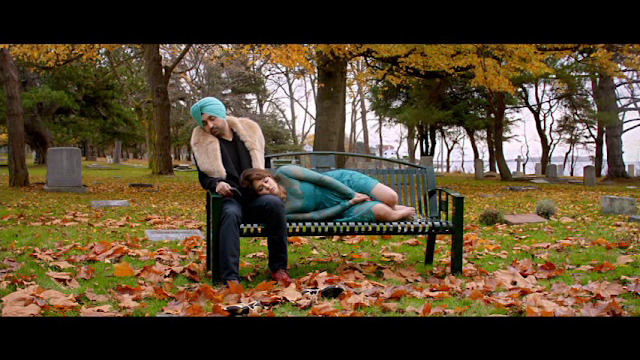The reincarnation revenge drama, like the snake movie, is one of those subgenres you don't normally see outside of India. (Sometimes reincarnation revenge dramas are snake movies!) It's a fairly simple formula: our hero is brutally murdered, but he comes back in his next life to defend his loved ones and avenge his own death. Of course, they tend to have the same problem. It takes time for the reincarnated hero to grow up and get into revenge-taking shape, so no matter how you dress it up, in the end you have a virile young hero beating up an old guy. Eega (2012) finds a way around the problem, though, and it is clever.
Nani (Nani), a poor but charming fireworks salesman, lives across the street from Bindu (Samantha), who works for a charity and creates micro-art in her spare time. (All of this will be important later.) Naturally he loves her, but she studiously ignores him. He is convinced that she's just playing hard to get. (Ugh.)
Bindu's charity needs money, so she approaches suave businessman Sudeep (Sudeep). Sudeep is happy to help, because he is a sexist creep who believes that he can have any woman in the world and who probably murdered his wife. Sudeep doesn't just donate money; he hangs around and feigns interest in the charity's work, all to get closer to Bindu. He is worried about Nani, though. And he is right to be so, because Bindu really has been playing hard to get. (UUUUGHH.)
Before Bindu can tell Nani how she really feels, Sudeep's men kidnap him, and Sudeep steals his phone, reads Bindu's romantic text messages aloud, then kills him. Fortunately, Nani is immediately reincarnated . . . as a housefly, which means it's time for a quick change of genre as Nani explores his strange new oversized world. He eventually winds up in Sudeep's office, though, and immediately regains his memory, so it's time for REVENGE!
Or not. The tiny fly literally bounces off Sudeep. Nani settles for an ongoing campaign of harassment, leaving Sudeep twitchy and paranoid. But despite his best efforts (including a car crash), it's clear that he's going to need some help. Thanks to Bindu's powerful magnifying equipment (because micro-art) and some spirited gestures, Nani explains who he is and what happens to him, and Bindu immediately joins Team Kill Sudeep. She makes him tiny armor and weapons, there's a training montage, and I suddenly find myself wondering exactly who the target audience for this movie is.
For the most part, Nani's crusade against Sudeep is played for laughs; it's more Tom and Jerry than The Punisher. Nani's early experiences as a fly are very light-hearted and filled with wonder as well as danger. And there's a light framing story in the opening credits, with a father telling the tale of the bad man and the fly to his young daughter. And yet the hero is murdered onscreen, Nani and Bindu are planning to kill Sudeep, and the final confrontation is brutal and bloody. Is this a particularly violent kid's movie, or an unusually whimsical action movie? I don't know.
What I do know is that Eega manages to neatly sidestep the "beating up an old guy" problem. You can't help but be the underdog when you're a literal housefly.






